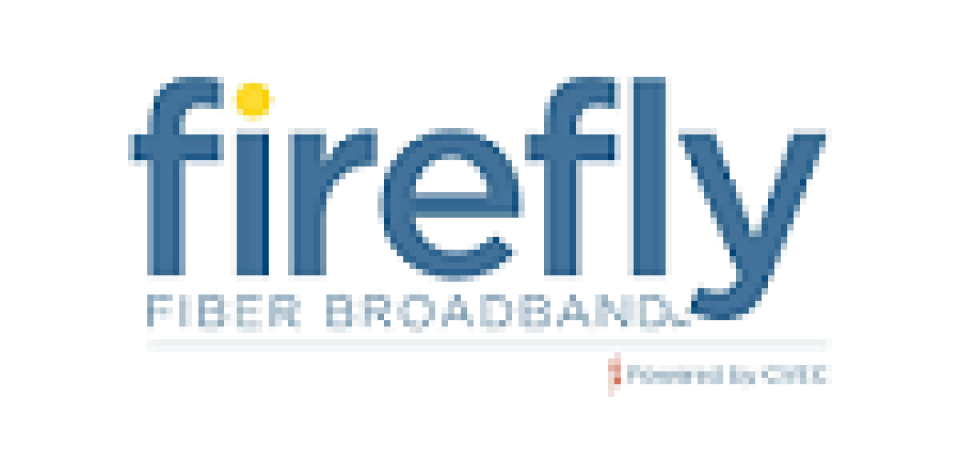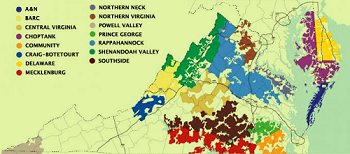
Fast, affordable Internet access for all.

Across the Commonwealth of Virginia, local governments, county broadband authorities, cooperatives, and private Internet Service Providers are leveraging the influx of American Rescue Plan funds to reach the state’s goal of achieving universal access to high-speed Internet connectivity by 2024.
With $850 million in state appropriations for broadband connectivity and $1.15 billion in local government and private service providers’ funding matches, the state is on track to invest $2 billion dollars toward broadband expansion in the coming years, and is currently investing in broadband expansion projects at record levels.
In August, Gov. Ralph Northam and the Virginia State Legislature agreed to devote $700 million of the state’s $4.3 billion in American Rescue Plan funds to expand access to broadband. The $850 million investment the state has announced will consist mostly of American Rescue Plan aid. The funds will be administered by the Virginia Telecommunication Initiative (VATI), which distributes grants to public-private partnerships to extend broadband service to unserved regions of the state, or areas that lack access to Internet service delivering connection speeds of at least 25/3 Megabits per second (Mbps).
Public-Private Partnerships Deep in the Heart of Virginia
From the marsh grasslands making up Virginia’s Eastern Shore, across the three peninsulas carved out by the Chesapeake Bay, all the way to the Shenandoah Valley in the West, a diverse array of regional partnerships have formed between Virginia’s local governments, electric and telephone cooperatives, and private ISPs as broadband expansion efforts continue to advance in 2022.
One of the largest partnerships vying for VATI dollars in 2022, organized by the Thomas Jefferson Planning District Commission, includes two electric cooperatives, investor-owned utility Dominion Energy, and 13 counties located across central Virginia.
Rappahannock Electric Cooperative, Firefly Fiber Broadband

(a wholly-owned subsidiary of Central Virginia Electric Cooperative), Dominion Energy Virginia, and the counties of Albemarle, Amherst, Appomattox, Buckingham, Campbell, Cumberland, Fluvanna, Goochland, Greene, Louisa, Madison, Nelson and Powhatan are proposing a $307 million-dollar broadband project to bring high-speed Internet service to every unserved location across all thirteen counties. To help defray those costs, the coalition of public and private partners is seeking $85 million from the Virginia Department of Housing and Community Development (DHCD), which administers the VATI program.
The regional fiber expansion project, which the utilities will contribute $187 million for and the participating counties have committed a combined $35 million to in matching funds, will bring broadband at gigabit speeds to over 40,000 locations in central Virginia and will allow a population of more than 100,000 Virginians to have “access to the same essential utility that their urban neighbors have now enjoyed for decades,” according to the partnership’s VATI application [pdf]. All told, that’s a little more than $7,200 per household served.
“Dominion Energy plans to install fiber in rural areas that can be used for operational needs as well as broadband access, reducing broadband deployment costs for ISPs,” reports Telecompetitor. “Under the agreement, ISP Firefly will lease the middle-mile fiber installed by Dominion Energy to extend fiber-to-the-home service to homes and businesses.”
Virginia is home to 13 electric cooperatives delivering power to nearly one-third of state residents.

Over half of the electric co-ops in the state serve residents in northwestern and central Virginia, making it an ideal area in which partnerships with electric utilities can bring fiber-to-the-home connectivity.
Serving the Unserved in Northern Virginia
Meanwhile, in the northernmost point of Virginia, eight counties have come together to form a partnership with the Rappahannock Electric Cooperative (REC), the Shenandoah Valley Electric Cooperative (SVEC), All Points Broadband, and Dominion Energy Virginia to bring fiber-to-the-home Internet service to all remaining unserved premises in Augusta, Clarke, Fauquier, Frederick, Page, Rappahannock, Rockingham, and Warren counties. With the participating counties putting up $62 million matching funds, if the partnership’s application for $97 million in VATI funds is awarded by the DHCD, once the fiber network is built-out it will pass over 42,000 premises. That comes to about $3,800 per premises.
Under the agreement, REC will build fiber in the region to replace a 30-year-old microwave communications system used for its offices and electric grid. In the portions of the service area not served by REC, the SVEC will deploy fiber to connect its substations and other facilities. Those middle-mile networks will include additional strands of fiber along the core routes, which will be utilized by All Points Broadband to extend last-mile fiber into the unserved areas of the proposed project area, according to the partnership’s VATI application [pdf].
All Points Broadband, a private ISP, is also working with 11 other Virginia counties to apply for VATI funding in 2022. Read more about All Points’ projects and partnerships here.
Many, Many More Projects on the Way
To bring high-speed Internet access to a region separated from the mainland of Virginia, the Eastern Shore of Virginia Broadband Authority, a public authority created jointly by Accomack and Northampton counties to construct an open access backbone network along Virginia’s Eastern Shore, is requesting $12 million from the DHCD [pdf] for a $15 million dollar project to bring the two counties to universal coverage.

And, in southeast Virginia, a regional initiative being pursued jointly by the Southside Planning District Commission, Mecklenburg Electric Cooperative (MEC), EMPOWER Broadband (a wholly-owned subsidiary of MEC), and the counties of Brunswick, Halifax, Mecklenburg, and Charlotte, in partnership with Dominion Energy Virginia, Mid-Atlantic Broadband, and Southside Electric Cooperative, would result in universal broadband coverage to currently unserved and underserved locations across the four counties.
There are dozens of other broadband expansion projects underway across the Commonwealth. Check out the full list of partnerships seeking VATI funding in Fiscal Year 2022 here. And, you can read more about projects backed by American Rescue Plan funding here.
History of the Virginia Telecommunication Initiative
Created in 2016, the Virginia Telecommunication Initiative (VATI) was investing only $4 million a year in broadband expansion when Gov. Northam took office in 2018. “Since then, the state has awarded $124 million in grants to connect more than 140,000 homes, businesses and other institutions,” reports Virginia Business.
In 2021, the state broadband program awarded just shy of $50 million in grants — $29.6 million in January to five projects connecting 11,743 Virginia homes and businesses, and $20.1 million in March “to 11 communities and their broadband network operator partners for projects expected to improve broadband access to more than 13,400 homes,” reports Fierce Telecom.
There is $50 million available again in VATI grants in FY 2022, although the amount of funding being requested by a single applicant has increased tenfold in the last year. As reported by Virginia Business, “last month, VATI received 57 applications from 84 localities requesting $943 million to connect more than 250,000 homes and businesses. The state Department of Housing and Community Development is reviewing applications to make awards by the end of the year.”
Barriers to Municipal Broadband Remain
The Northam administration is poised to make the largest investments in broadband infrastructure in Virginia history, yet state legislators have done little to eradicate state-held legal barriers to municipal broadband networks even as some individual state lawmakers have submitted legistislation to change that.
Delegate Mark Levine put forth a bill during the state’s 2020 and 2021 legislative sessions, HB 1052, which would “remove all barriers to municipal broadband and would even allow such public telecoms to provide phone and cable television services as well (while also removing restrictions on cross-subsidies and the need to hold a referendum),” reports ArlFiber. “Coinciding with Del. Levine’s telecom reform bill in the 2020 session was a narrower one from Del. Steve Heretick: HB 1242, which, according to its own summary, would allow government entities to ‘offer telecommunications, Internet access, broadband, information, and data transmission services.’” However, all three bills failed to make it past House subcommittees.
As detailed by ArlFiber, “While the Code of Virginia does not outright ban

localities from creating public entities that provide retail Internet service to residents and businesses in Virginia, the existing restrictions make it simply impossible for municipal providers to be competitive or even get off the ground.”
From the Coalition for Local Internet Choice:
“[The state] allows municipal electric utilities to become certificated municipal local exchange carriers and to offer all communications services that their systems are capable of supporting (except for cable services), provided that they do not subsidize services, that they impute private sector costs into their rates, that they do not charge rates lower than the incumbents, and that comply with numerous procedural, financing, reporting and other requirements that do not apply to the private sector.”
Learn more about Virginia’s legal barriers to municipal broadband here.
In addition to long-standing legal barriers preventing the establishment of publicly-owned municipal broadband networks, Virginia’s state broadband program is not friendly to municipal applicants, as it requires government applicants to apply with a private co-applicant. While broadband expansion in the state of Virginia will continue to rely on local collaboration, other states have prioritized community-based solutions when setting aside American Rescue Plan funds for broadband expansion, including the state of Maryland which earmarked $45 million of relief funds for grants to bolster investment in municipal broadband networks.
The original version of this story incorrectly stated that current law prohibits municipal networks from charging less than incumbent competitors for any equivalent service. In fact, muncipalities in Virginia can form wireless broadband authorities to provide Internet-only service, and are not subject to the rate sections of the current legislation. Thanks to Catharine Rice for the clarification.
Header image of Virginia Tech Support icon illustrated by Bubaone courtesy of iStock
Map of electric cooperatives in Virginia courtesy of VirginiaPlaces.org via Creative Commons Attribution-Share Alike 4.0 International
